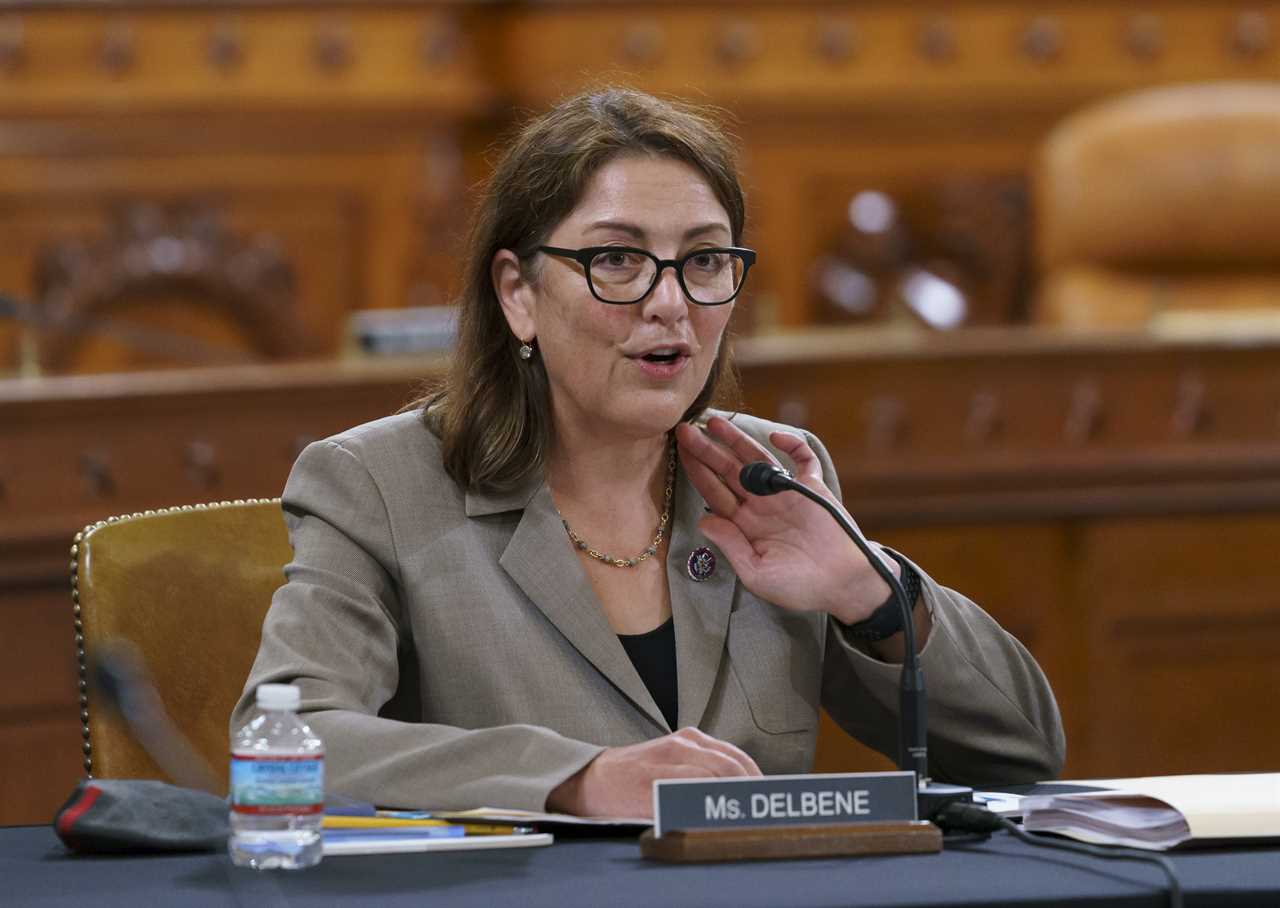
It’s hard to find lawmakers willing to publicly side with the big tech companies these days. But Google, Facebook, Amazon, Apple and Microsoft have a powerful champion left on Capitol Hill: Democratic Rep. Suzan DelBene of Washington state.
And as Congress gets increasingly close to a vote on an anti-monopoly bill that would rein in the tech titans’ power, the lawmaker from Amazon and Microsoft's home state could be a major reason that it fails.
DelBene has used her perch as chair of the business-friendly New Democrats caucus to push back on some of the most aggressive efforts to regulate or restrain Silicon Valley, which she claims would hurt the economy and hamstring the tech industry.
Now Senate Majority Leader Chuck Schumer and House Speaker Nancy Pelosi are under pressure to hold a vote this summer on the American Innovation and Choice Online Act, S. 2992 (117) — a bill that would prevent tech companies from using their gatekeeper power to disadvantage competitors.

And the tech industry has DelBene in their corner, leading opposition in the House.
“We love Representative DelBene,” said Rob Atkinson, founder and president of the tech-funded think tank Information Technology and Innovation Foundation. (DelBene is an “honorary co-chair” of the think tank.) Atkinson said DelBene is a key proponent of policies that favor “innovation.”
Behind her back, some of DelBene’s congressional colleagues, both moderates and progressives, gripe that she is an apologist for large tech companies that are some of her most important donors.
But DelBene — who has also condemned antitrust efforts in Europe against tech companies and spent years pushing privacy legislation backed by industry — argues she is an even-handed lawmaker with a special understanding of the tech industry from her 12 years as an executive at Microsoft, and startups before that.
“This is something I have a lot of understanding on and want to make sure we have strong, durable policy for the long term,” Delbene said in an interview. “I think that’s important on privacy and that is important on antitrust.”
Asked about her critics, DelBene said: “It’s unfortunate when, instead of engaging, people question folks’ integrity.”
DelBene denies that she follows the lead of the biggest tech companies. She was one of the first lawmakers to introduce legislation that would protect online privacy and supports an increase in funding for the country’s major antitrust enforcers, the Federal Trade Commission and the Justice Department antitrust division.
And, DelBene’s office pointed out, she’s recently pushed for privacy-related sections that industry does not support, referring to provisions of a bill currently in the House Energy and Commerce committee that would require companies that are “large data holders” to conduct compliance audits and provide the results to the FTC.
DelBene, who has a serious demeanor and the professionalism of a former corporate executive, is known on Capitol Hill as friendly but persistent. She has a habit of lecturing her colleagues on how certain parts of the tech industry, such as e-commerce and online advertising, operate.
Nick Martin, DelBene’s spokesperson, said the congresswoman isn’t opposed to antitrust reform in general, but she has specific concerns about the multiple antitrust bills under consideration right now, which she has agitated against since they passed out of the House Judiciary Committee last year.
That includes the American Innovation and Choice Online Act, which Schumer has pledged to put on the floor as soon as this summer. If it moves through the upper chamber, the companion bill in the House is likely to quickly follow.
In interviews, half a dozen lobbyists for big tech companies said they see DelBene, with her key position of power in the House, as the tech industry’s most effective champion on Capitol Hill.
“She is playing a key leadership role in the House, elevating the unintended consequences of antitrust reform to small businesses, to our national security, to privacy and the cyber protections that the targeted companies provide both at home and abroad to consumers,” said Carl Holshouser, senior vice president for operations and strategic initiatives at TechNet, a trade group that represents large tech companies including Google, Facebook’s parent company Meta, Amazon and others.
DelBene has particularly rubbed several of her fellow New Democrats the wrong way with her advocacy. When she spearheaded a letter last year calling to delay the committee markup of the House Judiciary antitrust bills, a number of the New Democrats’ 98 members expressed frustration and claimed it did not speak for the whole caucus.
Since then, DelBene has made personal appeals to several lawmakers who are considering supporting the antitrust legislation, at various points approaching lawmakers on the House floor during votes to try to convince them not to support the bills, according to two aides familiar with the interactions. The aides were granted anonymity because they were not authorized to speak on the record.
DelBene said she and others have “continued to express concerns” about the bills. Many members of the California delegation have raised their own qualms with the legislation targeting their home state companies. And beyond them, DelBene noted that a group of Senate Democrats argued in a recent letter that the legislation could affect the platforms’ ability to take down hate speech and misinformation. The co-sponsors of the bills, including House Judiciary antitrust subcommittee chair David Cicilline (D-R.I.) and Sen. Amy Klobuchar (D-Minn.), have said those allegations are untrue.
During a private meeting earlier this year with Cicilline, DelBene, who has many Amazon employees in her district, was one of only two members of the New Democrats to raise concerns about the bills’ “narrow focus on a few select companies,” said a House aide familiar with the call, who was granted anonymity to speak about a private conversation. Only 12 members of the centrist New Democrats attended the call, along with an assortment of staffers.
“DelBene has not been shy in her resistance to regulating the tech platforms and creating more competition in the ways that the House antitrust subcommittee is intending to do,” said Sarah Miller, executive director of the anti-monopoly think tank American Economic Liberties Project.
Staffers with the House Judiciary Committee who are advocating for the legislation have hit back by encouraging members of the New Democrats to sign onto the bills as co-sponsors. Ten members of the caucus have signed onto one of the antitrust bills in recent months, according to the most recent list of cosponsors.
“The top line is, DelBene has said she has spoken for a coalition of moderate Democrats with one voice, as anti-tech regulation,” said one of the congressional aides, who works for a member of the New Democrats. “But she is not speaking for all New Dems. That’s obvious by the co-sponsorship of the bills.”
DelBene's rejection of the antitrust legislation does differ from that of Microsoft, her former employer which has headquarters in her district. (She was a corporate vice president for Microsoft’s mobile communications business for several years. Before that, she worked on marketing and product development — including on Windows and Internet Explorer.)
Microsoft, which faced years of antitrust-related lawsuits, has lobbied in favor of the antitrust bills, claiming that the tech industry should be regulated.

Adam Kovacevich, a former Google lobbyist who now heads the Chamber of Progress, a trade association funded by companies including Google and Meta, said DelBene is a “moderate pragmatist” focused on representing the views of her pro-tech constituents.
Many of DelBene’s detractors point to her financial backers as proof that she is excessively aligned with the tech industry. DelBene’s individual donations list reads as a who’s who of the tech industry’s Washington influence machine. She has received $144,534 from tech executives and lawyers, including Amazon’s top lobbyist Brian Huseman, Google’s chief legal officer Kent Walker, and Microsoft CEO Satya Nadella. (DelBene is one of a handful of lawmakers that Nadella has donated to, including California Democratic Rep. Ro Khanna and Washington Democratic Rep. Adam Smith).
She has also received around $129,500 from Google, Amazon, Facebook, and tech trade groups Technet and the Consumer Technology Association since she came to Congress — a sum much larger than lawmakers overseeing tech-heavy districts like California Democrats Rep. Ro Khanna (D-Calif.) and Anna Eshoo (D-Calif.). Still, that’s much less than Rep. Zoe Lofgren, who has received more than $270,000 from the big tech companies’ PACs. Lofgren is one of the other major lawmakers speaking out against the antitrust bills in the House.
DelBene said her campaign contributions do not influence her policy decisions. “People support me because they believe in me and the job that I’m doing,” she said.
DelBene argues the tech issue Congress should be focusing on is data privacy rather than antitrust. It’s an argument that the tech industry has turned to as well. While the largest players in the tech industry can likely handle the barrage of new costs and regulations that privacy regulation would create, overhauling antitrust laws could mean fundamentally changing the companies’ business practices and seriously hurt their bottom lines.
DelBene was one of the first lawmakers to introduce privacy legislation back in 2018, just as the tech industry was beginning to push for a light-touch federal privacy law. Her legislation, which would give users control over whether companies can share or sell their private data, has drawn support from industry groups like the U.S. Chamber of Commerce.
Some privacy advocates say her legislation, the Information Transparency and Personal Data Control Act, doesn’t give consumers enough rights and would undercut tougher state laws. But DelBene says the legislation is a compromise that protects consumers’ rights while helping small businesses stay afloat.
“The important thing on privacy is that we have a consistent policy across the country so peoples’ rights are protected everywhere,” DelBene said. “We have five different state laws now and they’re all different. That makes it incredibly difficult for small businesses and others to be able to keep up with different policies and how to apply those different policies.”
It’s unclear whether the American Choice and Innovation Online Act will go to a vote over the next few months. But either way, DelBene has staked out a position as a lawmaker who’s willing to support the tech industry’s efforts.
“She looks at policy questions and she really tries to call them as she sees them,” said Atkinson, of ITIF. “In this case, she firmly believes that these innovations are going to be critical to our country’s future. She’s willing to stand up and say that.”
----------------------------------------
By: Emily Birnbaum
Title: Meet the lawmaker Big Tech lobbyists rely on
Sourced From: www.politico.com/news/2022/06/30/suzan-delbene-big-techs-favorite-lawmaker-00043320
Published Date: Thu, 30 Jun 2022 03:30:00 EST
Did you miss our previous article...
https://consumernewsnetwork.com/politics-us/opinion-a-grand-compromise-on-abortion






